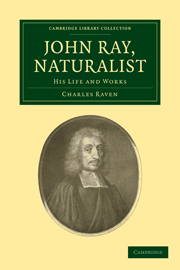Book contents
- Frontmatter
- Contents
- Preface
- Introduction
- ABBREVIATIONS
- Chapter I Boyhood and Youth
- Chapter II At Cambridge University
- Chapter III First Studies in Science
- Chapter IV The Cambridge Catalogue
- Chapter V The Years of Travel
- Chapter VI The English Catalogue
- Chapter VII The Years of Varied Output
- Chapter VIII The Structure and Classification of Plants
- Chapter IX The History of Plants
- Chapter X The Flora of Britain
- Chapter XI Last Work in Botany
- Chapter XII The Ornithology
- Chapter XIII The History of Fishes
- Chapter XIV Of Mammals and Reptiles
- Chapter XV The History of Insects
- Chapter XVI Of Fossils and Geology
- Chapter XVII The Wisdom of God
- Conclusion
- Index
Chapter XVI - Of Fossils and Geology
Published online by Cambridge University Press: 07 September 2010
- Frontmatter
- Contents
- Preface
- Introduction
- ABBREVIATIONS
- Chapter I Boyhood and Youth
- Chapter II At Cambridge University
- Chapter III First Studies in Science
- Chapter IV The Cambridge Catalogue
- Chapter V The Years of Travel
- Chapter VI The English Catalogue
- Chapter VII The Years of Varied Output
- Chapter VIII The Structure and Classification of Plants
- Chapter IX The History of Plants
- Chapter X The Flora of Britain
- Chapter XI Last Work in Botany
- Chapter XII The Ornithology
- Chapter XIII The History of Fishes
- Chapter XIV Of Mammals and Reptiles
- Chapter XV The History of Insects
- Chapter XVI Of Fossils and Geology
- Chapter XVII The Wisdom of God
- Conclusion
- Index
Summary
Nor did his artful labours only shew
Those plants which on the earth's wide surface grew,
But piercing ev'n her darkest entrails through
All that was wise, all that was great he knew
And nature's inmost gloom made clear to common view.
Ray's Epitaph translated, General Dictionary, viii, p. 695.Ray's work as a botanist and zoologist was mainly concerned with description and classification; and as such lay outside the area of speculative and controversial science. He found the study of nature in a primitive and inchoate state, and was content to devote himself to the primary business of observing, discriminating, defining and arranging the flora and fauna to which he could get access. The need for such work and the magnitude of his contribution to it are obvious: there could be no scientific biology until it had been undertaken. In perceiving and insisting that specific distinctions must be based not upon size or colour, habitat or habits, but upon structure, Ray vindicated his claim to be something more than a maker of collections and catalogues, and repudiated in advance Linnaeus's criticism of him. If his researches into plant and animal anatomy seldom led him beyond the study of taxonomy into the problems of form and function, still less into those of evolution or genetics, he very effectively laid the foundation for such studies and, as we have seen, pointed the way towards them.
- Type
- Chapter
- Information
- John Ray, NaturalistHis Life and Works, pp. 419 - 451Publisher: Cambridge University PressPrint publication year: 2009First published in: 1942



